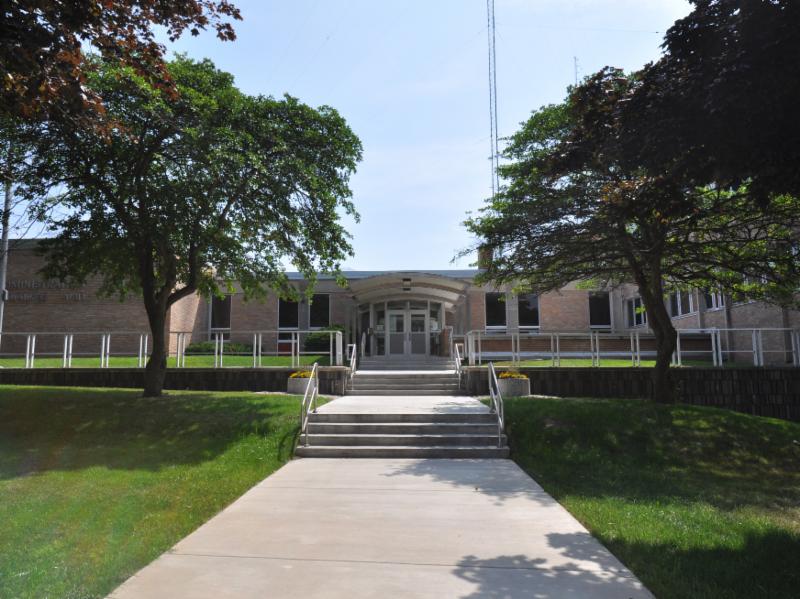MPS, Other Districts Using Pass/Fail for Second Semester
School leaders say it's most equitable grading system under Safer At Home order.

Milwaukee Public Schools Office of School Administration, 5225 W. Vliet St. Photo courtesy of Milwaukee Public Schools.
Two of Wisconsin’s five largest school districts, as well as other districts around the state, have opted to grade students on a pass/not pass scale in response to the school-year disruptions brought on by the COVID-19 pandemic.
The Madison Metropolitan School District and Milwaukee Public Schools have opted to grade children on a pass/no pass scale. Officials say this plan will hold students harmless from the pandemic’s disruptions.
“We know that, due to unforeseen circumstances, some of our students are not able to even access virtual learning right now. And with that, we did not want them to be penalized or not be afforded the same opportunity as students who are able to access them,” Cindy Green, Madison school district’s executive director of secondary programs and pathways, said in a virtual media availability last week. “We felt that a pass/no pass was the best way to go that was most equitable for all our students, and didn’t disadvantage students that were already disadvantaged.”
Madison schools are also freezing GPAs as they were at the end of the first semester — second semester pass/no pass grades won’t be included in the calculation. District officials said they will be able to assign letter grades if a third party — a university, a scholarship organization, an insurance company — requests them, but said the colleges and other institutions they’ve been talking to have said they’re likely to make accommodations on GPA or grade requirements due to COVID-19.
Green Bay Area School District parents can choose whether they want their children in grades six and up assessed with letter grades or with a pass/”No Grade COVID-19 Closure” option. For those in kindergarten through fifth grade, their final grades won’t be lower than what they had earned as of March 13. District officials said teachers will be communicating and giving feedback to elementary students on a weekly basis.
Eau Claire middle and high schools are similarly moving to an pass/fail scale, with younger students to get comments from teachers about their progress in key areas.
“We’re doing this in a way that gives students feedback about their work, but doesn’t penalize them because they’re not in the kind of classroom that they’re used to,” said Eau Claire Superintendent Mary Ann Hardebeck.
Other districts have also moved to some variation of a pass/no pass model. Stevens Point Area School District students in 4K through sixth grade will, similarly to Green Bay, earn a pass or “not accessed at this time” for fourth quarter and second semester grades. Older students will have three options — pass with distinction (an 80 percent and above), pass (a 60 percent and above), or no credit (59 percent and above).
“While letter grades are sometimes questioned for fidelity and meaning in a traditional school environment, letter grades are a potentially even less accurate description of learning in an E-learning environment due to difficulty in monitoring integrity, types of assessment and feedback, and variance of timelines,” Stevens Point Superintendent Craig Gerlach wrote in a letter to parents. “This change will ensure equity and the opportunity for students to earn credits and progress towards graduation.”
Sorting out how to grade students whose learning has become irregular or interrupted since schools closed is just one hurdle school districts have to clear. Many are now turning to how they’ll handle summer school, graduation and other annual events that will have to look very different because of the pandemic.
“Our hearts just go out to the students who are seniors now,” said Hardebeck. “There’s so many of those milestones that seniors expect to experience and celebrate, like spring sports, and the prom, and their final spring concerts, and awards assemblies, and their visits to campuses and things — not to mention the graduation ceremony.”
Listen to the WPR report here.
Wisconsin Schools Go Pass/Fail For Second Semester As COVID-19 Complicates Learning was originally published by Wisconsin Public Radio.
If you think stories like this are important, become a member of Urban Milwaukee and help support real, independent journalism. Plus you get some cool added benefits.
More about the Coronavirus Pandemic
- Governors Tony Evers, JB Pritzker, Tim Walz, and Gretchen Whitmer Issue a Joint Statement Concerning Reports that Donald Trump Gave Russian Dictator Putin American COVID-19 Supplies - Gov. Tony Evers - Oct 11th, 2024
- MHD Release: Milwaukee Health Department Launches COVID-19 Wastewater Testing Dashboard - City of Milwaukee Health Department - Jan 23rd, 2024
- Milwaukee County Announces New Policies Related to COVID-19 Pandemic - David Crowley - May 9th, 2023
- DHS Details End of Emergency COVID-19 Response - Wisconsin Department of Health Services - Apr 26th, 2023
- Milwaukee Health Department Announces Upcoming Changes to COVID-19 Services - City of Milwaukee Health Department - Mar 17th, 2023
- Fitzgerald Applauds Passage of COVID-19 Origin Act - U.S. Rep. Scott Fitzgerald - Mar 10th, 2023
- DHS Expands Free COVID-19 Testing Program - Wisconsin Department of Health Services - Feb 10th, 2023
- MKE County: COVID-19 Hospitalizations Rising - Graham Kilmer - Jan 16th, 2023
- Not Enough Getting Bivalent Booster Shots, State Health Officials Warn - Gaby Vinick - Dec 26th, 2022
- Nearly All Wisconsinites Age 6 Months and Older Now Eligible for Updated COVID-19 Vaccine - Wisconsin Department of Health Services - Dec 15th, 2022
Read more about Coronavirus Pandemic here





















